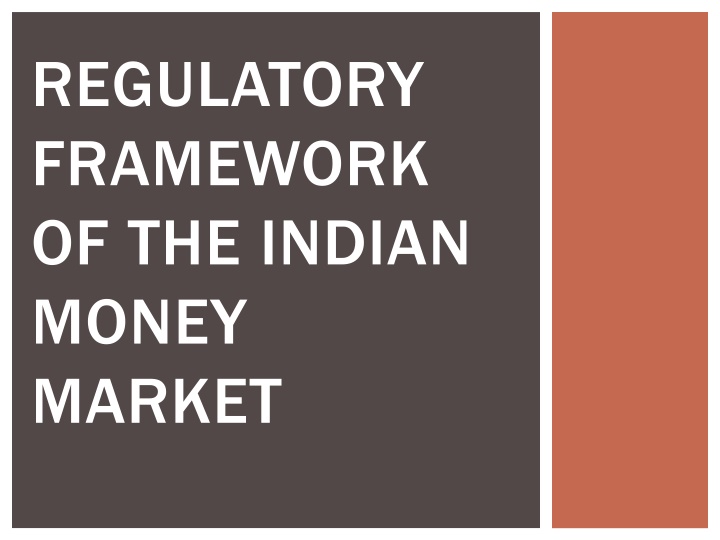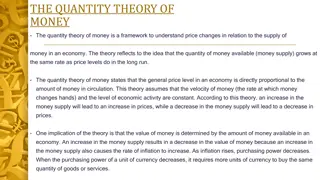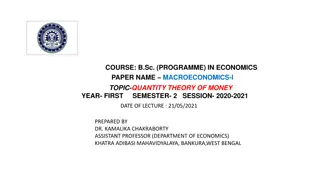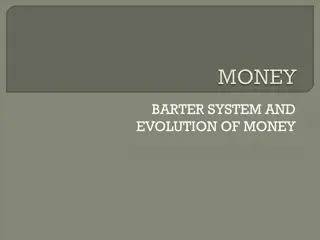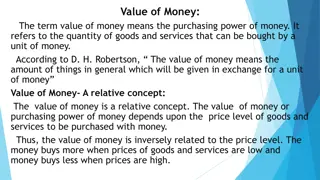Regulatory Framework of Indian Money Market
The regulatory framework of the Indian money market involves key entities like the Reserve Bank of India and FIMMDA, governing various aspects from qualitative and quantitative instruments to market development and best practices. FIMMDA represents market participants, aids market growth, and sets objectives to enhance market efficiency. It covers a wide scope of financial instruments, providing guidelines and regulations for smooth operation. Collaboration with regulators and members ensures transparency and adherence to standards, fostering a robust financial environment in India.
Download Presentation

Please find below an Image/Link to download the presentation.
The content on the website is provided AS IS for your information and personal use only. It may not be sold, licensed, or shared on other websites without obtaining consent from the author.If you encounter any issues during the download, it is possible that the publisher has removed the file from their server.
You are allowed to download the files provided on this website for personal or commercial use, subject to the condition that they are used lawfully. All files are the property of their respective owners.
The content on the website is provided AS IS for your information and personal use only. It may not be sold, licensed, or shared on other websites without obtaining consent from the author.
E N D
Presentation Transcript
REGULATORY FRAMEWORK OF THE INDIAN MONEY MARKET
RESERVE BANK OF INDIA Refer to the assignment Qualitative and Quantitative Instruments of RBI
FIMMDA Fixed Income Money Market and Derivatives Associations of India (FIMMDA), is an association of Scheduled Commercial Banks, Primary Dealers, Financial Institutions and Insurance Companies. It was incorporated as a company under Section 25 of the Companies Act 1956 on June 3rd, 1998. FIMMDA is a voluntary market body for all bond, money and derivatives markets. It has members representing all major institutional segments of the market. The membership includes Nationalised Banks such as SBI, its associate banks, other nationalised banks; Private Sector Banks such as ICICI Bank, HDFC Bank etc.; Foreign Banks such as Citibank, ABN Amro etc.; Financial Institutions such as EXIM Bank, NABARD etc.; Insurance Companies like LIC, ICICI Prudential etc. and all Primary Dealers.
FIMMDA represents market participants and aids the development of the bond, money and derivative market. It acts as an interface with the regulators on various issues that impact the functioning of these markets. FIMMDA also undertakes developmental activities such as Introduction of benchmark rates and new derivatives instruments etc. FIMMDA releases rates of various Govt securities that are used by market participants for valuation purposes. FIMMDA also plays a constructive role in the evolution of best market practices by its members so that the market as a whole operates transparently as well as efficiently.
OBJECTIVES 1. To function as the principal interface with the regulator on various issues that impact the functioning of these markets. 2. To undertake developmental activities such as introduction of benchmark rates and new derivatives instruments. 3. To provide training and development support to dealers and support personnel at member institutions. 4. To adopt / develop international standards practices and a code of conduct in the above fields of activities. 5. To devise standardized best market practices. 6. To function as an arbitrator for disputes between member institutions. 7. To develop standardized sets of documentations. 8. To assume any other relevant role facilitating smooth and orderly functioning of the said markets.
The scope of FIMMDA includes the following : Call Money/ Notice Money, Term Money, Bill Rediscounting, Commercial Papers, Certificate of Deposit, Dated Govt Securities, Treasury Bill, Bond Debentures etc. It has recommended many provisions, rules, guidelines as well as regulations for all the above mentioned instruments. However incase of any other law or regulations or guidelines laid down by any other statutory authority in India like the RBI, the latter shall prevail.
FOREIGN EXCHANGE DEALERS ASSOCIATION OF INDIA (FEDAI)
FEDAI Foreign Exchange dealers Association of India (FEDAI) was set up in 1958 as an association of banks dealing in foreign exchange in India (called Authorized Dealers) as a self regulatory body and is incorporated under section 25 of the Indian Companies Act 1956. Its major activities include framing of rules governing the conduct of inter bank foreign exchange business among the banks vis a vis public and liaison with the RBI for reforms and development of Forex market for the conduct of the foreign exchange business for AD s.
Recently some of the functions are as follows : Guidelines and rules for Forex Business Training of bank personnel in the areas of foreign exchange business. Accreditation of Forex business Advising and assisting member banks in settling issues, matters in their dealings. Represent member banks on Govt/RBI/other bodies Announcement of daily and periodical rates to member banks
FEDAI plays a catalytic role for the smooth functioning of the markets thru closer coordination with RBI, FIMMDA, Forex Associations of India and various market participants. FEDAI rules were prepared taking care of the interest of time. However to boost foreign trade to and fro India, it became imperative by FEDAI to review the rules and guidelines. FEDAI has taken due care of the interest of both importers and exporters while revising rules and guidelines. It carries out periodic review of the rules and incase of need amends the rules.
NEGOTIATED DEALING SYSTEM ORDER MATCHING (NDS-OM)
